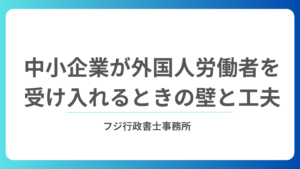文化の違いは、職場で“誤解”になることも
日本の職場では「空気を読む」ことが重視され、協調性や謙虚さが評価されます。一方で、外国人労働者の多くは「自分の意見をはっきり言う」「とりあえずやってみる」という文化の中で育ってきています。そのため、職場での行動や発言が日本人にとって「自己主張が強い」「勝手に動いている」と受け取られることがあります。
In Japanese workplaces, reading the atmosphere and showing humility are highly valued. In contrast, many foreign workers come from cultures where expressing one’s opinion clearly and taking initiative are encouraged. As a result, their actions or words may be seen by Japanese colleagues as overly assertive or inconsiderate.
外国人は「失敗を恐れず、行動する」
外国人の多くは、「やってみないとわからない」「まず行動することが大切」と考えています。特に特定技能や技術・人文知識・国際業務の在留資格で働く人々は、現場で学びながらスキルアップすることに前向きです。たとえ失敗しても、「次に活かせばいい」と考えるため、挑戦に対する心理的なハードルが低いのです。
Many foreign nationals believe that “you won’t know until you try” and that taking action is essential. Especially those on Specified Skilled Worker or Engineer/Specialist in Humanities/International Services visas are eager to learn on the job and improve their skills. Even if they fail, they tend to view it as a learning experience, which lowers their psychological barriers to trying new things.
日本人は「空気を読む」を優先しすぎる?
日本人の多くは、「空気を読む」「失敗しないようにする」ことに意識が向きがちです。その背景には、学校教育や社会全体の同調圧力、上下関係の厳しさがあります。上司の顔色をうかがい、自分の意見を控える傾向が強く、結果的に「変化を恐れる」「指示待ちになる」といった消極的な姿勢が生まれてしまいます。
Many Japanese workers focus on “reading the room” and avoiding mistakes. This tendency is rooted in the education system, social pressure to conform, and strict hierarchical relationships. As a result, they often hesitate to voice opinions or take action without explicit instructions, leading to a passive workplace culture.
すれ違いが生まれる典型的なシーン
たとえば、外国人スタッフが「自分で判断して行動した」ことが、日本人上司には「勝手なことをした」と見なされることがあります。また、外国人が意見を率直に述べた際に、日本人は「空気が読めない」と感じる場合も。こうしたすれ違いは、悪意があるわけではなく、文化的背景の違いに起因しています。
For example, a foreign staff member may take independent action, believing it shows initiative. However, a Japanese supervisor might interpret it as going off-script. Similarly, when a foreigner speaks candidly, Japanese coworkers might feel that they lack awareness of group harmony. These misunderstandings are not caused by malice but by cultural differences.
どうすれば理解し合えるのか
大切なのは、「価値観が違っていて当然」という前提を持ち、すぐに否定せず相手の背景を理解しようとする姿勢です。外国人に対しては、「報告・連絡・相談」の重要性を丁寧に伝えることが効果的です。一方で、日本人側も「自分で考えて動く力」を評価し、積極的な提案を歓迎する雰囲気づくりが求められます。
What matters most is recognizing that different values are natural and making an effort to understand others without judgment. For foreign workers, it’s important to clearly explain the value of reporting and consultation in Japanese workplaces. Meanwhile, Japanese coworkers should learn to appreciate independent thinking and create an environment where suggestions and initiatives are welcomed.
衝突があっても、チームには好影響をもたらす
文化や価値観の違いが原因で、意見の食い違いや誤解が生じることもあります。ときには衝突に発展するケースもありますが、それは悪いことばかりではありません。異なる考え方に直面することで、これまでの当たり前を見直し、新たな気づきを得る機会になります。外国人と協働することで、日本人社員の中に「挑戦していいんだ」「自分で考えていいんだ」という意識変革が起きることも多く、チーム全体の柔軟性や創造性が高まる傾向にあります。
Differences in culture and values can sometimes lead to disagreements or even conflict. However, such situations aren’t necessarily negative. Being exposed to different perspectives encourages people to question their assumptions and discover new ways of thinking. Working with foreign colleagues often inspires Japanese team members to realize that it’s okay to take initiative or embrace challenges. As a result, the entire team becomes more flexible and innovative.
共生だけでなく、「競争力」も生きていく上で欠かせない
外国人労働者が努力を惜しまない理由のひとつは、「生き残るための競争」があるからです。在留資格の更新、職場での評価、キャリアの選択など、彼らは常に次のステップを意識しています。日本人にとっても、少子高齢化が進む社会で、自分の価値を高めることはますます重要になっています。共に働く中で、お互いに切磋琢磨しながら成長する姿勢こそが、多文化社会の本質だと言えるでしょう。
One reason foreign workers are so diligent is because they live within a constant sense of competition—whether it’s renewing their visa, gaining recognition at work, or planning their career path. In Japan’s aging society, maintaining and improving one’s own value is becoming increasingly important for Japanese people as well. In a truly multicultural society, it’s not just about coexisting—it’s about learning and growing through mutual challenge and collaboration.
“違い”をチームの強みに変える
文化の違いは、適切に理解し合えば大きな武器になります。外国人の「行動力」と日本人の「配慮深さ」は、相互に補完し合える関係です。指示通りに動く人材だけでは、変化の激しい時代に対応できません。異なる価値観を持つメンバーが協力し合うことで、柔軟で強いチームが生まれます。
When properly understood, cultural differences can become a team’s greatest strength. The proactive nature of foreign workers complements the thoughtful approach of Japanese employees. In today’s fast-changing world, organizations need more than just people who follow orders—they need diverse thinkers who collaborate effectively. Together, they can form a more flexible and resilient team.
行政書士として伝えたいこと
私たちは在留資格の申請や更新を通じて、多くの外国人の姿を見てきました。彼らは決して「わがまま」なのではなく、「責任感」と「自立心」に基づいた行動をとっていることが多いのです。その真意が職場で正しく伝わるよう、私たちも制度面からサポートしていきます。
Through visa applications and status changes, we’ve seen that most foreign nationals act out of responsibility and independence—not selfishness. It’s important that their intentions are accurately understood in the workplace. As administrative professionals, we strive to support this through proper legal and procedural assistance.
「こんなことで相談していいの?」
—— 大丈夫です! あなたの不安に丁寧に向き合います
フジ行政書士事務所では、日本で暮らす外国人の方が安心して生活できるよう、ビザのことはもちろん、手続き・仕事・暮らしの中で感じる不安や悩みにも寄り添っています。
「誰に相談したらいいかわからない」そんなときこそ、フジ行政書士事務所にご相談ください。
あなたにとっていちばん良い形を、一緒に考えていきます。
※LINEをご利用でない方は、▶ お問い合わせフォームはこちら からもご相談いただけます。










コメント